Module 2(u1-u2)
U1-U2知识点复习-2024-2025学年牛津译林版八年级英语上册(学生版)
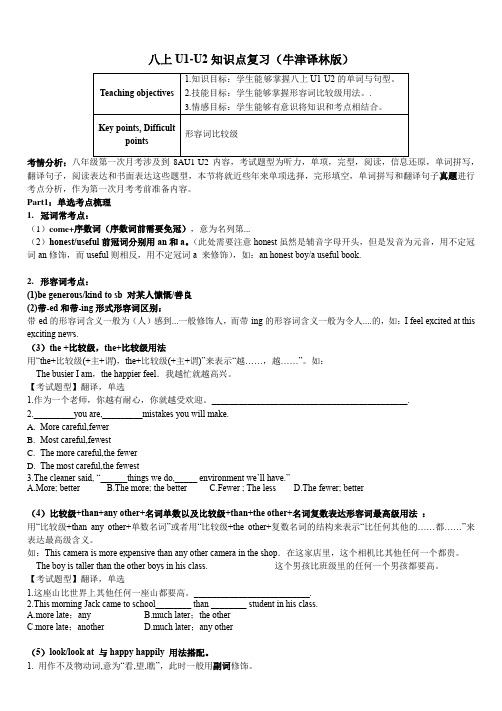
八上U1-U2知识点复习(牛津译林版)1.知识目标:学生能够掌握八上U1-U2的单词与句型。
2.技能目标:学生能够掌握形容词比较级用法。
.3.情感目标:学生能够有意识将知识和考点相结合。
考情分析:八年级第一次月考涉及到8AU1-U2内容,考试题型为听力,单项,完型,阅读,信息还原,单词拼写,翻译句子,阅读表达和书面表达这些题型,本节将就近些年来单项选择,完形填空,单词拼写和翻译句子真题进行考点分析,作为第一次月考考前准备内容。
Part1:单选考点梳理1.冠词常考点:(1)come+序数词(序数词前需要免冠),意为名列第...(2)honest/useful前冠词分别用an和a。
(此处需要注意honest虽然是辅音字母开头,但是发音为元音,用不定冠词an修饰,而useful则相反,用不定冠词a 来修饰),如:an honest boy/a useful book.2.形容词考点:(1)be generous/kind to sb 对某人慷慨/善良(2)带-ed和带-ing形式形容词区别:带-ed的形容词含义一般为(人)感到...一般修饰人,而带-ing的形容词含义一般为令人....的,如:I feel excited at this exciting news.(3)the +比较级,the+比较级用法用“the+比较级(+主+谓),the+比较级(+主+谓)”来表示“越……,越……”。
如:The busier I am,the happier feel.我越忙就越高兴。
【考试题型】翻译,单选1.作为一个老师,你越有耐心,你就越受欢迎。
____________________________________________.2._________you are,_________mistakes you will make.A.More careful,fewerB.Most careful,fewestC.The more careful,the fewerD.The most careful,the fewest3.The cleaner said, “______things we do,_____ environment we’ll have.”A.More; betterB.The more; the betterC.Fewer ; The lessD.The fewer; better(4)比较级+than+any other+名词单数以及比较级+than+the other+名词复数表达形容词最高级用法:用“比较级+than any other+单数名词”或者用“比较级+the other+复数名词的结构来表示“比任何其他的……都……”来表达最高级含义。
小学英语教材中有关国际理解教育的内容分析
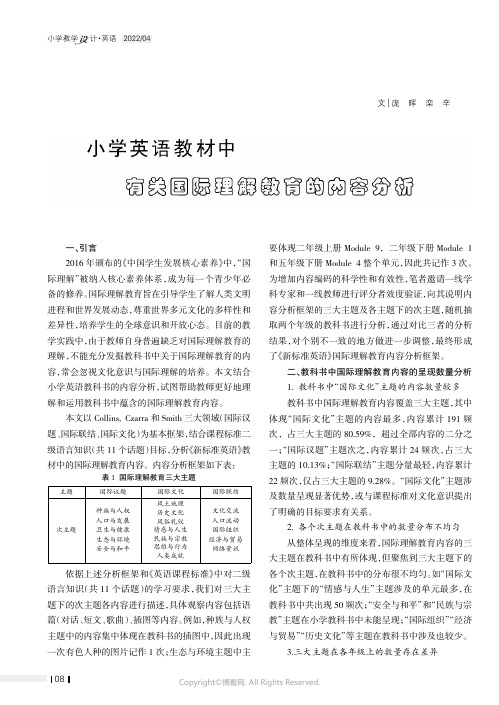
小学教学计·英语2022/04一、引言2016年颁布的《中国学生发展核心素养》中,“国际理解”被纳入核心素养体系,成为每一个青少年必备的修养。
国际理解教育旨在引导学生了解人类文明进程和世界发展动态,尊重世界多元文化的多样性和差异性,培养学生的全球意识和开放心态。
目前的教学实践中,由于教师自身普遍缺乏对国际理解教育的理解,不能充分发掘教科书中关于国际理解教育的内容,常会忽视文化意识与国际理解的培养。
本文结合小学英语教科书的内容分析,试图帮助教师更好地理解和运用教科书中蕴含的国际理解教育内容。
本文以Collins,Czarra和Smith三大领域(国际议题、国际联结、国际文化)为基本框架,结合课程标准二级语言知识(共11个话题)目标,分析《新标准英语》教材中的国际理解教育内容。
内容分析框架如下表:依据上述分析框架和《英语课程标准》中对二级语言知识(共11个话题)的学习要求,我们对三大主题下的次主题各内容进行描述,具体观察内容包括语篇(对话、短文、歌曲)、插图等内容。
例如,种族与人权主题中的内容集中体现在教科书的插图中,因此出现一次有色人种的图片记作1次;生态与环境主题中主要体现二年级上册Module9,二年级下册Module1和五年级下册Module4整个单元,因此共记作3次。
为增加内容编码的科学性和有效性,笔者邀请一线学科专家和一线教师进行评分者效度验证,向其说明内容分析框架的三大主题及各主题下的次主题,随机抽取两个年级的教科书进行分析,通过对比三者的分析结果,对个别不一致的地方做进一步调整,最终形成了《新标准英语》国际理解教育内容分析框架。
二、教科书中国际理解教育内容的呈现数量分析1.教科书中“国际文化”主题的内容数量较多教科书中国际理解教育内容覆盖三大主题,其中体现“国际文化”主题的内容最多,内容累计191频次,占三大主题的80.59%,超过全部内容的二分之一;“国际议题”主题次之,内容累计24频次,占三大主题的10.13%;“国际联结”主题分量最轻,内容累计22频次,仅占三大主题的9.28%。
牛津译林版七年级英语下学期期中复习教学案设计(Unit1-Unit2)
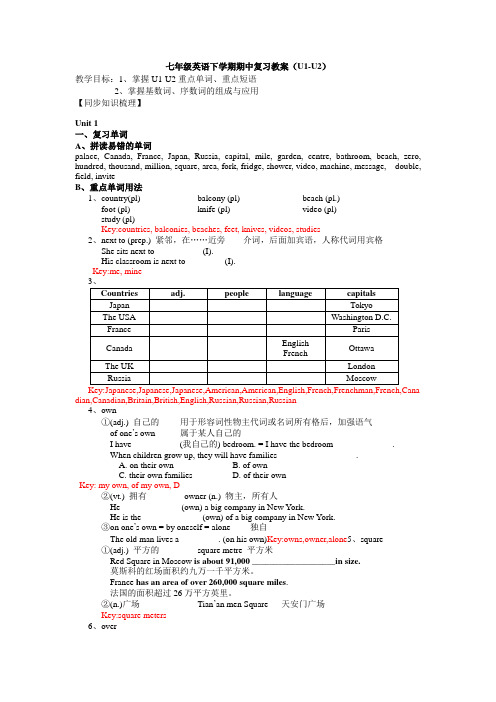
七年级英语下学期期中复习教案(U1-U2)教学目标:1、掌握U1-U2重点单词、重点短语2、掌握基数词、序数词的组成与应用【同步知识梳理】Unit 1一、复习单词A、拼读易错的单词palace, Canada, France, Japan, Russia, capital, mile, garden, centre, bathroom, beach, zero, hundred, thousand, million, square, area, fork, fridge, shower, video, machine, message, double, field, inviteB、重点单词用法1、country(pl)__________ balcony (pl) _________ beach (pl.)__________foot (pl)_____________ knife (pl)___________ video (pl)___________study (pl)__________Key:countries, balconies, beaches, feet, knives, videos, studies2、next to (prep.) 紧邻,在……近旁介词,后面加宾语,人称代词用宾格She sits next to___________(I).His classroom is next to_________(I).Key:me, minedian,Canadian,Britain,British,English,Russian,Russian,Russian4、own①(adj.) 自己的用于形容词性物主代词或名词所有格后,加强语气of one’s own 属于某人自己的I have___________(我自己的) bedroom. = I have the bedroom _____________.When children grow up, they will have families__________________.A. on their ownB. of ownC. their own familiesD. of their ownKey: my own, of my own, D②(vt.) 拥有owner (n.) 物主,所有人He______________(own) a big company in New York.He is the______________(own) of a big company in New York.③on one’s own = by oneself = alone 独自The old man lives a_________. (on his own)Key:owns,owner,alone5、square①(adj.) 平方的square metre 平方米Red Square in Moscow is about 91,000 ___________________in size.莫斯科的红场面积约九万一千平方米。
牛津深圳版(广州沈阳)广东省深圳高级中学2020第二学期八年级下 Moldule 2 Unit1-Unit2单元测试(含答案)

广东省深圳高级中学2020第二学期牛津深圳版英语八年级下U1-U2单元测试卷班级姓名分数I.单项选择(共35小题,每小题1分,共35分)i. 从下面每小题的A、B、 C三个选项中选出可以替换划线部分的最佳选项。
( )1. I enjoy reading because it gives me knowledge and brings me joy.A.sadnessB. happinessC. surprise( )2.—What does the expression on his face mean?—It means he is very happy.A. lookB. soundC. thought( )3. —I reminded you about the party today, but you still forgot it.—I’m very sorry for that.A. made ... leaveB. made ... organizeC. made ... remember ( )4. —Don’t worry. I believe nothing will take place because we’ve been ready for everything.—That’s good. But we’d better be careful.A. happenB. matterC. change( )5. —Look at me, Doris. Raise your spirits and everything will be OK.—You’re right. I should be confident.A. Get upB. Cheer upC. Look up( )6. —Did they finally accept your opinion in the meeting yesterday?—Yes. After I told them about it carefully, they all thought it was good.A.agree withB. take onC. put on( )7. —Have you got the message? There is going to be a party tonight.—Yes. Amy has told me about that.A.thoughtB. prizeC. news( )8. Finally, Linda won first prize in the competition without any difficulty.A. carefullyB. quicklyC. easily( )9. I’m sure that she will make a good impression on us.A.clearB.certainC. serious( )10. —Why did you sleep at the drawing class?—Because I am bored with drawing.A. am good atB. feel likeC. get tired of( )11.—Tom, would you like to play football with me now?—Sorry. I’m afraid not. I’m busy at the moment, but we can play together this afternoon.A.just nowB. right nowC. at onceii. 从下面每小题的A、B、C三个选项中选出可以填入空白处的最佳选项。
U1-U2基础知识宝典答案

U1-U2基础知识宝典答案Unit 1 Topic 11. --- What are you going to do? --- I am going to play basketball.2. I often see you play basketball .I see you playing basketball now.3. I hope our team will /can win.4. ---Would you like to cheer us on? ---- Sure, I?d love/like to..5. practice skating6. I prefer rowing to swimming.7. join the school rowing teamjoin usjoin in the basketball match = take part in the basketball match8.Yao Ming is 2.26 meters tall.9. He plays for the Houston Rockets.10. ---What are you going to be when you grow up? --- I?m going to be a scientist like him.11. She spends half an hour exercising every day.I spent 5 yuan on/buying this book.12. There is going to be a school sports meet next weekend.13. make him strong keep her heart healthymake me monitor keep tryingmake Maria clean the room keep me doing homework14.Ma Long is popular with most people.15. It?s a good way to keep fit.16. Running is good for my heart and lungs.17. For the last 20 years, he was very famous.18. The exciting news makes me excited.19. It?s a pity that they isn?t going to stay for long.20. They are leaving for Japan the day after tomorrow.Unit 1 Topic 21.kick the ball to you = kick you the ballbring (buy)the book for you = bring(buy) you the book2. One of my teammates fell ill.3. --- Would you mind teaching me? --- Of course not./ Certainly not./ Not at all.4.Would you mind if I try it again?5.---Would you mind not putting your bike here? --- Sorry,I …ll put it somewhere else.6. Would you mind us/ our borrowing your money?7. Could you help me? = Could you give me a hand?8. Don?t shout at me like this.He shouted to me just now.9.have a fight (n.) with sb. = fight (v.) with sb.10.try/do one?s best to do sth.11. We should learn teamwork.12. be angry with sb. / be angry at/ about sth.13.Kangkang , what about saying sorry to Michael?14.--- Michael , I? m sorry for what I said. = Michael, I?m sorry for my words. ----It?s nothing.15. You are sure to have more fun.have fun (in) doing sth.have much fun = have a lot of fun= have a good time = enjoy oneself16. with Jane?s help = with the help of Jane17. I made a cake for my grandfather.18. Basketball is one of the most popular sports.19. It has a history of over a century.20. There were many great inventors in ancient China. They invented many great inventions.21. It was an indoor game so that students could play in bad weather. (目的状语从句)He is so young that he can't go to school. (结果状语从句)22.In 1946, NBA came into being.23. Now many good players come from other countries.24. It?s a team sport with two teams of 5 players each.25. stop sb. From doing sth. = prevent/ keep sb. from doing sth.26. There are many kinds of pollution, for example , noise isa kind of pollution.I like many sports, such as playing football, swimming , running and so on.27. To win the basketball games, you should have good skills.28.It?s important for you to learn English well.29.How do you score in basketball?30.A number of people like basketball.The number of our class is sixty.31.The people of England are sports lovers.32.(turn A into B) They turned most of their main players into famous persons.33. It is a game played on grass by two teams of eleven players each.34. I planted the tree.The tree was planted by me .35. Players wear white clothes and score points by hitting the ball with a bat.36. People can sit around the green, enjoying the sun, havingdrinks and watching the games.37. I ride my bike, listening to music.The teacher came into the classroom with a book.run with a ballUnit 1 Topic 31. The school sports meet is coming.2. Will you take part in/ join in/ be in it?3. ---Which sport will you take part in? ----The boys? 800-meter race.4. I?m an eight -year-old boy.I?m eight years old.a 500-word letter5. I believe you will win.6 I?m sure the sports meet will be exciting.I feel excited.7. It?s my first time to take part in the high jump.= It?s the first time for me to take part in the high jump.= I take part in the high jump for the first time.8. I?m preparing for the long jump.I prepared the gift for your birthday party.9. I will do my best. I won?t lose.10. the teachers? relay race11. B: OK. What shall we take?B: When shall we meet?B:Where shall we meet?12. I bought a pair of running shoes last week.13. make friends with sb.14. Let?s make it half past five! ( √)15. at the theater/ catch up with sb.16. All the four boys are neck and neck.17. The two boys run into each other.18. The Olympic rings are a symbol of the Olympic Games.19. They stand for the five parts of the world.I can?t stand the noise any more.20.at least / at most21.The Olympic Games are held (hosted) every four years.22. Nowadays, the Olympic Games are held by different cities in turn.23. every three days24. The Olympics are becoming more and more popular.25. In the future, more cities will have the chance to hold the Olympics.26. Beijing hosted the 29th Olympics and China won 51 gold medals.27. held, felt, won, ran, won, is, won, are, did, are, will dotook, did, was, love, be, will do, will be28.Each player should help the others on his team.= Every player should help the other players on his team.= Each of the players should help the others on his team.29.If everyone plays well together, your team will do well.30. break the world record31. He is widely regarded as the fastest person in the world. (被动语态)1.情景交际A:Hello, Kangkang! You don?t look well. What?s wrong with you ?B: I have a toothache.A: How long have you been like this?B: Two days.A: You should see a dentist. B: I think I will.A:I hope you can get well soon. B: Thank you.2.建议某人去做某事advise sb. to do sth./ 建议某人不去做某事advise sb. not to do sth.给某人一个建议give sb. a suggestion = give sb. a piece of advice采纳某人的建议take one?s advice / 遵循某人的建议follow one?s advice3.判断正误:表示人身体不舒服时,使用?(1)You don?t look good.(×) (2) You don?t look well. (∨)4.患感冒have a cold 患重感冒have a bad cold 患流感have the flu发烧/ 咳嗽/ 牙疼/ 背疼/ 胃疼have a fever/ cough/ toothache/backache/ stomachache眼睛疼have sore eyes / 喉咙疼have sore throat5.我晚上睡不好。
外研版七年级英语上册教案 Starter Module 2Unit 2

Unit2 What’syournumber?◇目标导航◇预习指导一、方法指导1.学生自主预习教材PS10~S11中的新单词(见词汇表P88),掌握单词读音及汉语意思。
2.预习课文中的对话,能自主朗读对话并翻译对话。
二、预习检测Ⅰ.汉译英1.一one2.二two3.三three4.四four5.五five6.六six7.七seven 8.八eight9.九nine 10.十ten11.学生student 12.新的newⅡ.根据汉语意思完成句子,每空一词1.你是这儿新来的学生吗?Are you a new student here?2.你在几班?What class are you in?3.我在三班。
I’m in Class 3 .4.——你的电话号码是多少?——是726 815。
—What’s your telephone number ?—It’s seven two six,eight one five.课堂教学Step1 情景导入老师带领学生复习学过的日常交际用语。
Step2 听对话并跟读,完成教材任务1,2和31.听录音,跟读,完成教材任务1。
(1)播放录音,训练学生听力,熟悉本课问句及答语。
(2)再次播放录音,让学生跟读,同时理解对话内容。
(3)老师重点难点,帮学生理解下列句子及用法: —Are you a new student here?—Yes,I am.—What class are you in?—I’m in Class 3.2.听录音并跟读,完成教材任务2。
(1)播放录音并跟读,学习数字1—10。
(2)学生先自主读数字,之后老师提问,先按顺序说,然后随机抽取数字说,以巩固这些英语单词。
3.听录音,完成教材任务3。
播放录音,学生跟着录音唱,老师解释下面句子的汉语意思。
Once I caught a fish alive.一旦我抓到了一条活的鱼。
Then I let it go again.那么我就让它再回到水里去。
5A M 2 U1教学设计

“牛津英语5A Module 2 Unit 1”教学设计一、课题Module 2 Unit 1 Me二、课型新授课三、教学三维目标(一)知识与技能目标1.能够听、说、读、写单词:at, night, morning, afternoon, evening。
2.能够听、说、认读句子:What time do you…? I…at…in…. 并能进行关键词的替换操练,达到熟练运用。
3.提高学生的听说读写能力和运用英语进行交际的能力。
(二) 过程与方法运用Ben’s day.这个情景突出了重点“What time do you…? I…at…in…..”学生们置身于模拟的情境中一起亲自去体验感受参与,并将所学知识运用于实际生活中,从而学会用英语做事情的能力。
(三)情感态度与价值观通过学习本课知识,引导学生养成良好的日常作息习惯.四、教学重点与难点1.能正确拼读单词at, night, morning, afternoon, evening。
2.能在日常生活中熟练运用句型What time do you…? I…at… in….3.主语是第三人称单数的表达是本课的难点.五、教学方法与手段情境教学法、任务型教学法、活动法等。
六、教学流程Step 1. Warm-upT: Good morning, boys and girls.S: Good morning, Miss Hu.T: Let’s sing a song together: If you’re happy.(设计意图:让全体学生跟着旋律做动作,唱英语歌曲,唤起学生的知、情兴奋点,让学生精神饱满、轻松愉快地进入英语学习状态。
同时为新知的传授做好铺垫)Step 2. Presentation1. 运用“If you’re happy.”这首歌引出morning。
T: I’m happy .Because tomorrow is Sunday. I can have a rest. I’m going to get up late. I can get up at 8:00 o’clock in the morning.T: morning means from 6:00 to 12:00./in the morning.afternoon means from12:00 to 6:00./in the afternoon.evenning means from 6:00 to 9:00./in the evenning.night means from9:00 to 6:00./at night.(设计意图:通过钟表练习不同时间段的表达方法,学生既学会单词,又能感悟单词。
新目标英语八年级上册U1-u2知识点
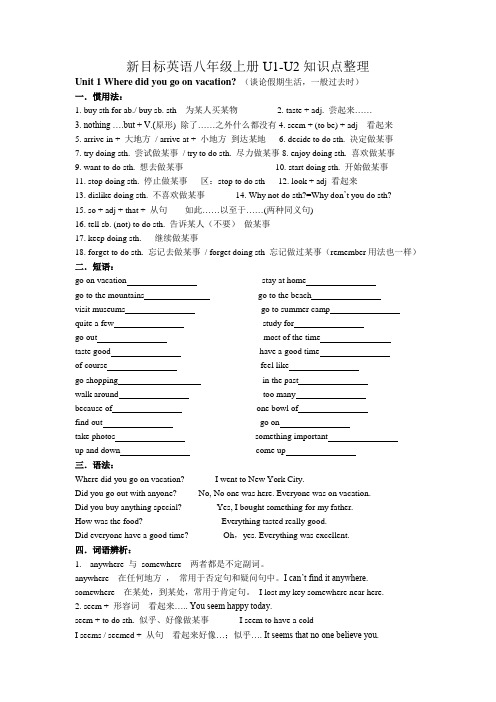
新目标英语八年级上册U1-U2知识点整理Unit 1 Where did you go on vacation?(谈论假期生活,一般过去时)一.惯用法:1. buy sth for ab./ buy sb. sth 为某人买某物2. taste + adj. 尝起来……3. nothing ….but + V.(原形) 除了……之外什么都没有4. seem + (to be) + adj 看起来5. arrive in + 大地方/ arrive at + 小地方到达某地6. decide to do sth. 决定做某事7. try doing sth. 尝试做某事/ try to do sth. 尽力做某事8. enjoy doing sth. 喜欢做某事9. want to do sth. 想去做某事10. start doing sth. 开始做某事11. stop doing sth. 停止做某事区:stop to do sth 12. look + adj 看起来13. dislike doing sth. 不喜欢做某事14. Why not do sth?=Why don’t you do sth?15. so + adj + that + 从句如此……以至于……(两种同义句)16. tell sb. (not) to do sth. 告诉某人(不要)做某事17. keep doing sth. 继续做某事seem like ….好像,似乎….. It seems like a god idea.3. decide to do sth.决定做某事They decide to visit the museum.4. start doing sth = start to do sth. 开始,可与begin 互换5. over 介词,多于,超过,在…以上(表示数目、程度)= more thanMy father is over 40 years old.6. too many 太多,后接可数名词复数:Mother bought too many eggs yesterday.too much 太多,修饰不可数名词,修饰动词作状语。
现代大学英语(第二版)听力(2)U1-U2
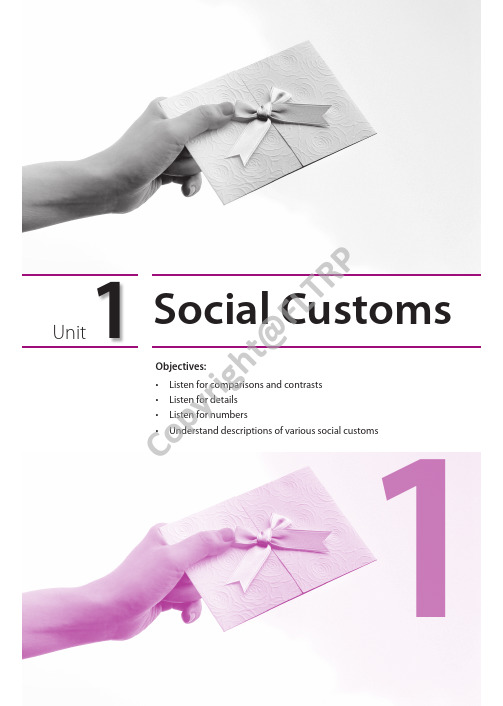
Various customs FLTRP Task
4 t@ In this task, you will hear six customs in different countries. Practice listening for details.
igh Listening aids yr Czech /tSek/. 捷克(欧洲中部国家)
2 Task
Britain and Japan
In this task, you will hear a conversation between a British man and a Japanese student comparing life in Britain and Japan. Practice making comparisons and noting differences while listening.
Social Customs Unit 1
5 Task
Life in Victorian times and now
In this task, you will hear a discussion about whether life is better today than it was in Victorian England. Make comparisons of the respective advantages and disadvantages with what you hear.
2) Why is it called square dance?
3) How does the caller tell the dancers what they should do?
Module2(教学设计)-英语四年级下册

四年级英语学科第二单元设计用到课堂中,让学生学会总结,多读,多背,多练,积极发言,提问,创造轻松愉快的英语学习氛围。
单元学习目标1.学习有关伦敦或其他城市与景点的核心词汇和句型,在看、听、说等活动中理解、听懂、会说:capital, about, beautiful, be from;I’m from London. London is the capital of England. It’s very big and very beautiful. long, wide, many, river, old, famous;This is the River Thames.It’s long and wide.2.学习文本,能理解文本大意,能正确、流利地朗读课文,能描述人物的性格特征,能根据图片及示范提示写句子。
3.学习有关形容词。
通过归纳,学会用形容词介绍城市或一处景点。
4.了解英国首都伦敦的标志建筑,激发学生学习英语的兴趣,树立正确的学习目的,养成良好的学习习惯,培养提高学生与他人交往的能力。
单元大任务设计课时安排及对应子任务Module 1 2课时子任务1:用所学的单词和句型简单描述伦敦。
子任务2:用所学的单词和句型简单介绍一座城市或景点。
子任务3:Make a poster of your school and introduce your school to others.目标导引下的教学评一致性课时备课A: What’s the capital of England? B: It’s London.Step4 迁移创新借助伦敦的海报,描述伦敦的特征。
Step5Homework1.抄写单词2.描述一个名胜古迹的特征板书设计教学反思目标导引下的教学评一致性课时备课课题Moudle1 U2 课型新授。
牛津沪教版小学英语四年级下册知识点总结

牛津沪教版小学英语四年级下册知识点总结沪教版四年级英语下册(上海牛津4B)知识点总结知识点总结单词表Module1UsingmyfivesensesU1TouchandfeelU2Smellandtastesmell闻;嗅strawberry草莓or或者;还是watermelon西瓜grape葡萄fox狐狸round圆的purple紫色的wait等待;等候minute一会儿;分钟get得到those那些U3Lookandseetouch碰;触摸feel摸起来;感到soft柔软的hard坚硬的thick厚的;粗的thin薄的;细的blind瞎的;失明的noise响声;喧华声young年轻的rise升起shadow影子noon正午high高的sky天空evening傍晚;晚上again再;又night夜晚moon玉轮him他stop停下atnoon在中午godown落下atnight在夜晚takeawalk散步Module2Myfavouritethings U4Subjectssubject学科;科目lesson课Chinese(学科)语文Maths(学科)数学English(学科)英语Science(学科)科学PE(学科)体育Music(学科)音乐Art(学科)美术timetable课程表;时间表from从;来自a.m.上午p.m.下午break苏息from…to…从…到…U5Sportsport体育活动football足球U6Musicwonderful令人舒畅的violin小提琴club俱乐部;兴趣小组guitar吉他join加入;插手tell告诉about关于basketball篮球volleyball排球us我们tabletennis乒乓球运动playfootball踢足球playbasketball打篮球playvolleyball打排球playtheguitar弹吉他whose谁的piano钢琴city城市bag袋子gold金子all全部;所以playtheviolin拉小提琴Module3MycolourfullifeUnit7MydayUnit8DaysoftheweeUnit9Afriendin ko’clock…点钟quarter一刻钟time工夫half一半wash洗dinner晚餐;正餐start开始catch捉住getup起床brush…teeth刷牙halfpast………点半havebreakfast吃早餐gotoschool去上学wash…face洗脸havelunch吃午餐havedinner吃晚餐gotobed上床睡觉week星期Monday星期一with和…….一起Tuesday星期二Wednesday星期三Thursday礼拜四Friday星期五game游戏Saturday星期六Sunday星期日clock时钟;钟playchess下国际象棋attheweekend在周末(be)latefor迟到AustraliaChina中国talk谈话May蒲月June六月January一月February仲春March三月April四月July七月August八月September九月October十月November十一月December十仲春email电子邮件hat帽子wear穿;戴yours你的;你们的everyyear每年Module4ThingsweenjoyUnit10MygardenUnit11Children’sday Unit12Theuglyducklingugly丑的;貌寝的duckling小鸭duck鸭子river江;河baby宝宝later后来;以后quack(鸭叫声)嘎嘎back背;背部away去别处swan天鹅into朝;向;到……里面garden花园plant动物leaf叶子water给……浇水them他们;她们;它们grow发展;发展seed种子everyday天天song歌曲zoo动物园cinema片子院museum博物馆also也;还haveaparty举行集会语法复习1.量词的用法Thereisa glass of water melon juice.Therearethree glassesof strawberry juice.2.选择疑问句和一般疑问句的区别(1)普通疑问句Isthe kite redandblue?(这鹞子是蓝白色的吗?)普通疑问句的回覆必需Yes或No开首Yes, it is./No, it isn’t.(2)选择疑问句Isthe kite redorblue?(这风筝是蓝色还是红色?)选择疑问句的回答必须是二选一:It’s red.或It’s blue.3.关于like后面接不同的名词和动词like apples / like green ones(可数名词复数)like the apple / like the green one(可数名词单数)like jelly(不可数名词)like dancing=like to dance(动词)would like to dance(would like to do=want todo)be like me/her/his father…(说明为像,作介词)4.叹息句What nice grapes!(复数)What a nice girl!(单数)5. whose对所有格提问Whose bag isthis?-----It’speter’s.(this/that回覆用it’s)Whoseknivesarethose?-----Theyarehisknives.(these/those回覆用they’re)6.so和too解释为如此、太时后面跟形容词It’s so thick. /He is so puzzled.It’s too noisy.7. How+助动词+主语+动词The pineapple is rough.(划线发问)How does the pineapple feel?This cherry is sweet.(划线提问)How does this cherry taste?8.祈使句和can句型永远用动词原形,即使有now,也不能是进行时祈使句Let’smakea card now.Kitty,don’tput your book on the floor.(否定句在动词前加don’t)can句型Can Lucyreadthe book now?(简单犯的毛病:瞥见Lucy一小我就用三单reads,或瞥见now用举行时)9. There be就近准绳,背面所接词必需看清是不是是可数名词从而肯定be动词Thereis acat and two dogs.(离得近的是单数)Thereare twodogs and a cat.(离得近的是复数)Thereissomepaper.(不可数)Therearesome paperrabbits.(前面有修饰的名词复数)Therearesomesheep.(单复数不异)Thereissomestring.(不可数)Thereisa lot of applejuice.(前面有润饰的不成数)10. both和all放在be动词之后,do动词之前We are both tall.(be动词之后)They are all blind.(be动词之后)We both run fast.(do动词之前)The brothers all touch the elephant.(do动词之前)11. one of the复数,谓语三单Oneof the boys isTom.saysone of the brothers12.普通时和举行时的区分举行时:当句子里有标记性的词如now,look,listen,it’s…几点(祈使句和can句型除外),或是某个有上下情景的句子表示这个动作现在正在发生,结构be+doingListen, birdsare singing.Where’s Sam? Heis playingfootball outside.一般时:当句子里有标志性的词如everymorning,onModay,atweedends, always, usually, often,sometimes,never, at…几点等,表示陈述某个事实。
人教部编版八年级上学期英语第一单元unit1-2复合不定代词及动词辨析笔记(教材重难点讲解)

U1-U2单元重难点考点拓展:【1】Wait 动词等待Wait for sb/sth.等待某人或某事I am waiting for the teacher to solve my problems on math.Be doing 表示正在做某事Wait to do sth.等待去做某事I wait to order some fruit in this restaurant.Can’t wait to do sth.迫不及待做某事I can’t wait to talk with this wise智慧的man.我等不及想要和这个智慧的人交流了。
【2】Will 情态动词+ do sth.特别地:be willing to do sth. 愿意去做某事例子:We are willing to attend the party tonight.我们愿意去参加今晚的派对!【be willing to do sth.】愿意去做某事【be waiting to do sth.】正等待去做某事【can’t wait to do sth.】迫不及待去做某事【can’t help to do sth.】情不自禁做某事例子:We can’t help to laugh.我们情不自禁地笑了。
练习:-I can’t wait! 我等不及啦!-What happens to you?你怎么啦?-I see a new route from Canada to China,and it’s my dream city.I can’t wait to go there with my parents.When I think of this trip, I can’t help to laugh.我迫不及待要和我的父母去那里了!当我想到这趟旅行时,我情不自禁地笑了。
A can’t wait ; can’t helpB can’t help;can’t waitC can’t wait;can’t waitD can’t help;can’t help.【3】Too muchMuch tooToo many练习:用much too;too many;too much 填空There are too many books[可数名词复数形式] on the table.There is too much water【不可数名词】over the kitchenThe book is much too fantastic.[形容词]We all want to make too many friends【可数名词复数形式】in the school. Ming plays Kung Fu so well that some people overseas want to see【动词】much too【副词too修饰see;much修饰too。
四年级下册英语期末U1-U4 冲刺复习(知识精萃 模块综合测练)(广州教科版专版,word版含答案)
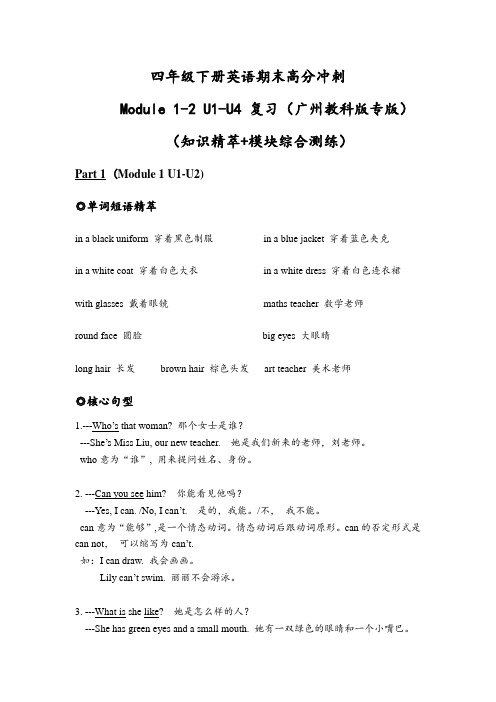
四年级下册英语期末高分冲刺Module 1-2 U1-U4 复习(广州教科版专版)(知识精萃+模块综合测练)Part 1 (Module 1 U1-U2)◎单词短语精萃in a black uniform 穿着黑色制服in a blue jacket 穿着蓝色夹克in a white coat 穿着白色大衣in a white dress 穿着白色连衣裙with glasses 戴着眼镜maths teacher 数学老师round face 圆脸big eyes 大眼睛long hair 长发brown hair 棕色头发art teacher 美术老师◎核心句型1.---Who’s that woman? 那个女士是谁?---She’s Miss Liu, our new teacher. 她是我们新来的老师,刘老师。
who意为“谁”, 用来提问姓名、身份。
2. ---Can you see him? 你能看见他吗?---Yes, I can. /No, I can’t. 是的,我能。
/不,我不能。
can意为“能够”,是一个情态动词。
情态动词后跟动词原形。
can的否定形式是can not,可以缩写为can’t.如:I can draw. 我会画画。
Lily can’t swim. 丽丽不会游泳。
3. ---What is she like? 她是怎么样的人?---She has green eyes and a small mouth. 她有一双绿色的眼睛和一个小嘴巴。
“What is...like? ...”意为“......是怎么样的?”,用来提问人物的外貌或性格。
4. He looks like a cook. 他看起来像是一个厨师。
look意为“看起来...”,后接形容词。
如:He looks shy. 他看起来很害羞。
look like 意为“看起来像...”,后接名词。
如: Her face looks like a red apple. 她的脸看起来像是一个红苹果。
七年级英语u1到u2的知识点
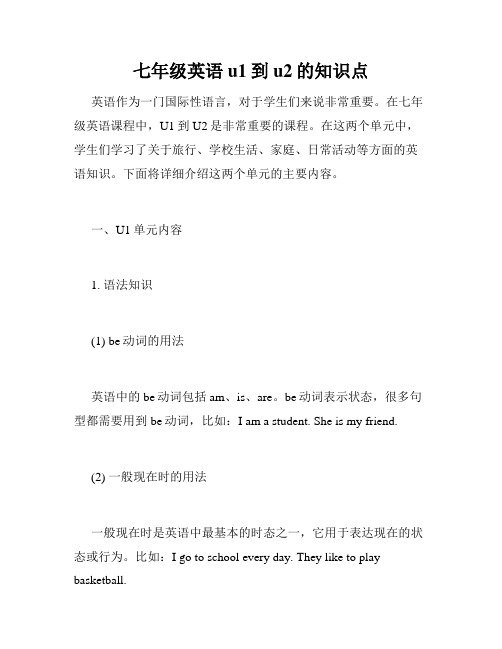
七年级英语u1到u2的知识点英语作为一门国际性语言,对于学生们来说非常重要。
在七年级英语课程中,U1到U2是非常重要的课程。
在这两个单元中,学生们学习了关于旅行、学校生活、家庭、日常活动等方面的英语知识。
下面将详细介绍这两个单元的主要内容。
一、U1单元内容1. 语法知识(1) be动词的用法英语中的be动词包括am、is、are。
be动词表示状态,很多句型都需要用到be动词,比如:I am a student. She is my friend.(2) 一般现在时的用法一般现在时是英语中最基本的时态之一,它用于表达现在的状态或行为。
比如:I go to school every day. They like to play basketball.(3) there be 句型there be 句型通常用于描述某个地方存在什么物品或者人。
比如:There is a pen on the desk. There are some books on the shelf.2. 生活知识(1) 旅行学生们在U1单元中学习了关于旅行的英语知识,包括询问路线、购买车票和在旅游景点中的日常互动等。
(2) 学校生活学生们也学习了关于学校生活的英语知识,包括日常活动、学校设施、课程表等。
二、U2单元内容1. 语法知识(1) 一般过去时的用法学生们在U2单元中学习了关于一般过去时的用法,包括规则动词的过去式、不规则动词的过去式等。
(2) can和can't的用法can和can't用于表示某个人是否具有某项能力。
比如:I can swim. She can't speak Chinese.(3) 疑问词的使用在U2单元中,学生们还学习了关于疑问词的用法,包括what、where、when等。
2. 生活知识(1) 家庭学生们在U2单元中学习了关于家庭的英语知识,包括家庭成员、房间内部和外部的描述等。
(完整word版)最新外研版(三起)新标准小学英语教材目录

新版三年级起点新标准小学英语教材目录(外研社)小学英语三年级起点(三年级上学期适用)(新版)目录 MODULE 1 Unit 1 I'm Sam.◆MODULE 1 Unit 2 How are you?◆MODULE 2 Unit 1 I'm Ms Smart.◆MODULE 2 Unit 2 What's your name?◆MODULE 3 Unit 1 Point to door.◆MODULE 3 Unit 2 Point to desk.◆MODULE 4 Unit 1 It's red!◆MODULE 4 Unit 2 It's a black dog.◆MODULE 5 Unit 1 How many?◆MODULE 5 Unit 2 Nine girls?◆MODULE 6 Unit 1 Happy birthday!◆MODULE 6 Unit 2 How old are you?◆MODULE 7 Unit 1 What's this?◆MODULE 7 Unit 2 What's that?◆MODULE 8 Unit 1 Is it a monster?◆MODULE 8 Unit 2 Where's the cat?◆MODULE 9 Unit 1 This is my mother.◆MODULE 9 Unit 2 He's a doctor.◆MODULE 10 Unit 1 This is his head.◆MODULE 10 Unit 2 Point to her nose◆Review Module Unit 1◆Review Module Unit 2◆Reading For Pleasure小学英语三年级起点第(三年级下学期适用)目录Module 1Unit 1 It's the ABC song.Unit 2 My favourite colour is yellow.Module 2Unit 1 They're monkeys.Unit 2 That man is short.Module 3Unit 1 I like football.Unit 2 I don't like riding my bike.Module 4Unit 1 Do you like meat?Unit 2 Does Lingling like oranges?Module 5Unit 1 She goes to school on Mondays.Unit 2 Does your mum go to work on Saturdays?Module 6Unit 1 What do you do on Sundays?Unit 2 What does Lingling have at school?Module 7Unit 1 We fly kites in spring.Unit 2 It's warm today.Module 8Unit 1 It's on your desk.Unit 2 Daming flies a kite in the park.Module 9Unit 1 I've got a new book.Unit 2 Has Amy got a bike?Module 10Unit 1 Here's a red hat.Unit 2 She's got an orange sweater.小学英语三年级起点第三册(四年级上学期适用)目录.Module 1 Unit 1 Go straight on.∙.Module 1 Unit 2 It's at the station.∙.MODULE 2 Unit 1 She's reading a book.∙.MODULE 2 Unit 2 What are you doing?∙.MODULE 3 Unit 1 What are they doing?∙.MODULE 3 Unit 2 What's the elephant doing?∙.MODULE 4 Unit 1 Do you want some rice?∙.MODULE 4 Unit 2 How much is it?∙.MODULE 5 Unit 1 Can you run fast?∙.MODULE 5 Unit 2 Can Sam play football?∙.MODULE 6 Unit 1 Can I have some sweets?∙.MODULE 6 Unit 2 Happy Halloween!∙.M7 U1 There is a house in this photo.∙.M7 U2 There are twelve boys on the bike.∙.M8 U1 We're going to visit Hainan.∙.M8 U2 Sam is going to ride a horse.∙.M9 U1 Are you going to run on sports day?∙.M9 U2 I'm going to do the high jump.∙.M10 U1 We have a big family dinner.∙.M10 U2 Merry Christmas!∙.Review Module∙小学英语三年级起点第四册(四年级下学期适用)目录Module 1Unit 1 She's a nice teacher.Unit 2 He's cool.Module 2Unit 1 London is a big city.Unit 2 It's very old.Moudle 3Unit 1 Robots will do everything.Unit 2 On Monday I'll go swimming.Module 4Unit 1 Will you take your kite?Unit 2 Will it be hot in Haikou?Module 5Unit 1 I was two then.Unit 2 They were young.Module 6Unit 1 Were you at home yesterday?Unit 2 Was it a big city then?Module 7Unit 1 I helped Mum.Unit 2 Grandma cooked fish.Module 8Unit 1 They sang beautifully.Unit 2 I took some pictures.Module 9Unit 1 Did he live in New York?Unit 2 Did you have a nice holiday?Module 10Unit 1 Did you fall off your bike?Unit 2 Sam had lots of chocolate.Revew Module小学英语三年级起点第五册(五年级上学期适用)目录课本封面:前言和目录∙.Module 1 U 1 Did you come back yesterday?∙.Module 1 Unit 2 We bought ice creams.∙.MODULE 2 Unit 1 What did you buy?∙.Module 2 U 2 How much cheese did you buy?∙.MODULE 3 Unit 1 Where did you go?∙.M 3 U 2 Daming took a photo of his father.∙.M 4 U 1 Mum bought a new T-shirt for me.∙.M 4 Unit 2 What's the matter with Daming?∙.M 5 U 1 There are only nineteen crayons.∙.MODULE 5 Unit 2 There are forty.∙.M 6 Unit 1 You can play football well.∙.M 6 Unit 2 He ran very fast.∙.M7 U1 He can't see.∙.M7 U2 This little girl can't walk.∙.M8 U1 What time does your school start?∙.M8 U2 Yesterday I went to school.∙.M9 U1 Are you feeling bored?∙.M9 U2 I feel happy.∙.M10 U1 He wasin the kichen.∙.M10 U2 Don't shout, please!∙.Review Module小学英语三年级起点第 (五年级下学期适用)目录Module 1 Unit 1 We lived in a small house.Module 1 Unit 2 She didn't have a television.Module 2 Unit 1 She learnt English.Module 2 Unit 2 Mr Li was a teacher.Module 3 Unit 1 She had eggs and sausages.Module 3 Unit 2 Sam ate four hamburgers.Module 4 Unit 1 Let's make a home library.Module 4 Unit 2 We can find information from...Module 5 Unit 1 It's big and light.Module 5 Unit 2 It's too big for you.Module 6 Unit 1 I went there last year.Module 6 Unit 2 She visited the Tianchi Lake.Module 7 Unit 1 My father goes to ...Module 7 Unit 2 I'll be home at seven o'clock.Module 8 Unit 1 Will you help me?Module 8 Unit 2 I made a kite.Module 9 Unit 1 We laughed a lot.Module 9 Unit 2 Mum bought new T-shirts for you.Module 10 Unit 1 Where are you going?Module 10 Unit 2 I'm in New York now.Review Module单词表Reading for pleasure小学英语三年级起点第七册(六年级上学期适用)(新版)目录.Module 1 U 1 It's more than twenty thousand kilometres long..Module 1 Unit 2 It's in the west..MODULE 2 Unit 1 There's Chinese dancing..Module 2 U 2 There are lots of beautiful lakes in China..MODULE 3 Unit 1 Collecting stamps is my hobby..Module 3 Unit 2 What's your hobby?.Module 4 Unit 1 Thanksgiving is my favourite festival..Module 4 Unit 2 Our favourite festival is the Spring Festival..Module 5 Unit 1 Can you be my Chinese pen friend?.MODULE 5 Unit 2 I can speak French..Module 6 Unit 1 You've got a letter from New York..Module 6 Unit 2 I can speak French..Module 7 Unit 1 I don't believe it!.Module 7 Unit 2 Pandas love bamboo..Module 8 Unit 1 Do you often play with dolls?.Module 8 Unit 2 I often go swimming..Module 9 Unit 1 Do you want to visit the UN building?.Module 9 Unit 2 I want to go to Shanghai..Module 10 Unit 1 Don't talk in the library..Module 10 Unit 2 Go straight on..Review Module小学英语三年级起点第八册(六年级下学期适用)目录Module 1 Unit 1 I want a hot dog, please.Module 1 Unit 2 What do you want to eat?Module 2 Unit 1 We're going to have a picnic.Module 2 Unit 2 It's going to snow in Harbin.Module 3 Unit 1 The sun is shining.Module 3 Unit 2 I am looking out of the window.Module 4 Unit 1 I'm making Daming's birthday card. Module 4 Unit 2 The apples are falling down the stairs. Module 5 Unit 1 Daming is having a birthday party. Module 5 Unit 2 He's riding his bike, but it's starting to rain. Module 6 Unit 1 I bought you this book.Module 6 Unit 2 What's it about?Module 7 Unit 1 Shenzhou Ⅴflew into space.Module 7 Unit 2 He spent about twenty-one hours in space. Module 8 Unit 1 Helen KellerModule 8 Unit 2 His name was Louis Braille.Module 9 Unit 1 What's the matter?Module 9 Unit 2 Because it's going to rain.Module 10 Unit 1 We are going to speak Chinese.Module 10 Unit 2 What are you going to study?Review Module Unit 1Review Module Unit 2Reading for Pleasure The Bear, the Tall Man and the Short ManReading for Pleasure A Book of MapsReading for Pleasure The Elephant and the Spider。
英语_六年级上册_U1-U2

C ontentsModule 1 Getting to know each other Unit Key patterns Key words Sounds1 Growing up(p. 2)• H er hair was shortand her eyes werebig.month, cute, pretty,handsome, catche, e-e, ee,ea, i, y2 My summer holiday(p. 8)• H ow was yoursummer holiday?I t was wonderful.We went to the GreatWall.famous, during,spend, everyone,countrysidee, a, ea3 Healthy or unhealthy?(p. 14)• W hat did you havefor breakfast thismorning?I had some bread andmilk.healthy, unhealthy,hamburger,yesterday, fruit, pie,pizza, sandwich,vegetable, chicken,chocolatep, b, t, d, k,c, ck, gRevision 1 (p. 20) Project 1 (p. 22)Module 2 RelationshipsUnit Key patterns Key words Sounds4Our neighbours(p. 24)• D id you play withSam last weekend?Yes, I did.neighbour, son,daughter, noisy, diga, ar, u, o5 Animals in danger(p. 30)• I n the past, therewere many pandas.thousand, hundred,wild, way, die, learn,sendue, u-e, oo,u6 E-friends (p. 36)• W ould you like tohave e-friends inother countries?e-friend, country,other, hobbyf, v, thRevision 2 (p. 42) Project 2 (p. 44)Module 3 Out and aboutUnit Key patterns Key words Sounds7 Seeing a film(p. 46)• S hall we go and see afilm this weekend?Sure.shall, police, exciting,boring, kill, asleeps, c, z, ts, ds8 Visiting museums(p. 52)• W hat did you see atthe museum?I saw a lot ofinteresting cars.bee, insect, ant,kind, finger, danceror, al, au,oor, o, a9 Great cities of the world(p. 58)• H ow long does it taketo get to Shanghaifrom Beijing by train?I t takes about fivehours.capital, north, east,west, south, tourist,buildinger, ir, ur, or,aRevision 3 (p. 64) Project 3 (p. 66)Module 4 The natural worldUnit Key patterns Key words Sounds10 Air (p. 68)• I t keeps them high inthe sky.air, everywhere,alive, factory,smoke, dirty, clean,fresh, plantch, g, j, sh,s11 Trees (p. 74)• W e get wood fromtrees.• W e use wood to makepencils.wood, cool, match,misstr, dr12 The Earth(p. 80)• W e should stop cuttingdown so many trees.Earth, part, forest,land, ocean, rubbish,sickReviewRevision 4 (p. 86)Project 4 (p. 88) Word list 1 (p. 90)Word list 2 (p. 93) Daily expressions (p. 96)Proper nouns (p. 96) Irregular verbs (p. 97)2Growing up1In Photo 1, Sally was a baby. She In Photo 3, Sally was about sixyears old. She was a primary school student.Now Sally is 14 years old. She goes to junior high school. She is tall and pretty. Her hair is long.In Photo 2, Sally was one year old. Her hair was short and her eyes were big.Her hair was short and her eyes were big.13243Getting to know each othercutehandsomepretty______ months old • small and cute• ______ years old • at primary school• ______ years old • tall and pretty • ______ hair• one year old• ______ hair and big eyes• Complete the notes about the photos.Little Justin1Little Justin was born in the river. It is spring. He is small and black.He looks around. He cannot find his mum.Justin:Mum, where are you?2Soon he has a round head and a long tail. He meets a fish in theriver. She also has a round head and a long tail.Justin:Mum?Fish:N o, I’m not your mum. Your mum has four legs. She’sgreen and she has no tail.4Later, Little Justin has four legs. He isgreen. He meets a turtle.Justin:Are you my mum?Turtle:No, I’m not your mum. Yourmum has a big mouth. Shecan catch flies.L ittle Justin finds his mother. What does his mother look like? Think and tick.greenfour legsa long tail a big mouth blackno legsno taila round headShe is …She has …35baby/six months old primary school student/11 years oldjunior high school student/14 years old pilot /22 years oldK i t t yM r sL iB e nM rL i1 32 4671 bean bin2 eat it3 seat sit4 these this5 least list 7leaveliveIn this photo, my ________________________________________.He/She was _________________.His/Her _____________________.In this photo, my ________________________________________.He/She was _________________.His/Her _____________________.e →sh e m e e-e →th e s e Chin e s e ee →b ee sw ee t ea →s ea r ea d i→i t th i s ver y earl yListen and circle.photos.My summer holiday2How was your summer holiday?It was wonderful. We went to the Great Wall.Alice:How was your summer holiday, Kitty?Kitty:I t was fun. I visited my grandparents. I also went to theAlice:Sure. I’ll show you tomorrow.During the summer holiday, I … I also … We …I had a wonderful summer holiday. I … We …the Great WallTian’anmen Squarethe Palace MuseumHow was their summer holiday? Match and say.In August, Alice visited her uncle in Beijing. She went there by plane. Alice went to the Great Wall, Tian’anmen Square and the Palace Museum. She enjoyed her summer holiday.During the summer holiday, Peter and his family went back to the UK. They spent their holiday in London. They visited Big Ben and the British Museum. Everyone had a good time.12Hi Kitty,I am having a good time in ________. I came here by ________ last Sunday. I visited ________________,Tian’anmen Square and _____________.How is your summer holiday?AliceDuring the summer holiday, Jill stayed with her grandparents in the countryside. She picked apples with her grandmother.Hi Joe,I am now on holiday in _______ in the UK. I visited Big Ben and the _____________ with my family this morning.How is your holiday?Peter3Complete the postcards.watched went visiteddidgreat fun not bad It was . I … Hi ______,I am now in _________________.I visited __________________________________________________________________________.How is your holiday?________You are on holiday. Write a postcard to your friend.Over the bridge, into the townOver the bridge, into the town, She rode her bicycle.She rode her bicycleOver the bridge,Into the town.She rode her bicycle,Up and down.Over the bridge, into the town, They rode their bicycles.They rode their bicyclesOver the bridge,Into the town.They rode their bicycles,Up and down.1 men man2 get fat3 bed bad4 any angry5 bread black6 head hadListen and circle.e→b e d p e ta→a ny m a ny ea→h ea d br ea d a→d a d b a cka pple bl a ck。
八年级英语上册(U1-U2)句型与语法练习 试题

心尺引州丑巴孔市中潭学校<U1-U2>句型与语法练习1.Can I have something to drink, please? 一些喝的东西指点迷:to drink 是动词不定式,用来修饰不定代词something。
动词不定式和形容词修饰不定代词时,放在被修饰词的后面。
即时练习① Do you want to ?(你想吃点东西吗)即时练习② I have ____________________________ to tell you (我有重要的事情告诉你)2、There’s nothing in the fridge. 冰箱里没有东西了。
There’s nothing else in the fridge. 冰箱里没有别的东西了。
句中else的意思是“此外、别的〞,常用于不定代词或副词、疑问代词或副词之后。
如:What else did he say? 他还说了些什么?3. make your friends so special 使你的朋友如此特别make sb. + adj. 使某人〔怎样〕即时练习①This song makes .〔这首歌使他如此悲伤〕What makes good friends? 什么样的人适合做好朋友?句中的make 相当于系动词,意思是“成为,适合〞即时练习①She will __________ ___________ _________ ________.(她会成为一名好老师)4.Does she care about you when you sad?(1)care about…“关心,关心,在乎〞后跟代词,名词,动名词即时练习①Our government ___________________________very much.(关心老人)即时练习②When Mary are sad,Lucy _______________________________ .〔关心她〕5.have problems有问题,有麻烦后常跟with sth./doing sth.即时练习①Do you __________ ___________ __________ friends?(你交朋友有困难吗)6.Do you believe what he says? 你相信他说的话吗?=Do you believe the words he says?==Do you believe his words?7、There’s nothing in the fridge. 冰箱里没有东西了。
- 1、下载文档前请自行甄别文档内容的完整性,平台不提供额外的编辑、内容补充、找答案等附加服务。
- 2、"仅部分预览"的文档,不可在线预览部分如存在完整性等问题,可反馈申请退款(可完整预览的文档不适用该条件!)。
- 3、如文档侵犯您的权益,请联系客服反馈,我们会尽快为您处理(人工客服工作时间:9:00-18:30)。
Module 2 Experiences Unit 1 I’ve also entered lots of speaking competitions. (学案一)学习目标1.掌握现在完成时在日常生活中的应用。
2. 掌握现在完成时的应用语境重点词汇:ever, enter,competition, prize, first prize, dream, afford,write about,invite重点短语:1.________a competition参加比赛2. ________ about 编写 3. ________ up 编造4. _____a prize获奖5. _____ about 考虑6._______a dream holiday7._______sb. to.. 邀请某人去…语法现在完成时:表示过去发生的动作,一直持续到现在,对现在产生一定的影响和结果。
构成:肯定式:主语+have/has+过去分词。
例如:I have had lunch. 我已吃过午饭了。
(现在不饿了。
) 否定式:主语+ have/has+not+过去分词。
例如:I haven’t had lunch. 我还没吃午饭。
一般疑问式:have/has提前Have you had lunch? 你吃过午饭了吗?肯定回答:Yes , 主语+ have/has. 否定回答:No , 主语+ haven’t/hasn’t .学习过程:一、小组预习大声朗读新单词,完成重点短语,并在文中划出来。
二、小组合作学习,阅读对话,回答问题:1.What kind of competition does Lingling enter? _______________________________________2.What’s the first prize of the speaking composition? _____________________________________3.Why doesn’t Lingling go on a dream holiday? ________________________________________4.Has Tony entered lots of speaking competitions?__________________________________________三、再次认真阅读对话,在对话中找出含有现在完成时的句子,并翻译。
四、结对练习。
A: Have you ever visited … ? B: Yes , I have . / No , I haven’t .五、小组合作完成活动3和活动4.六、达标检测一、句子翻译1.我也参加过许多演讲比赛。
I’ve also ___________ lots of _______________________ .2.我现在已经停止尝试了。
I’ve ________________________ now .3.你可能会赢得过一些奖项吗?Maybe , you will ________________________ .4.你曾经赢得过一些奖项吗?________ you ever ________ any prizes before ?二、完成单词。
1. Have you ever entered a c___________________ and a prize ?2. The first p_____________ is the holiday to England .3. I can’t _________________ (支付) the plane tickets .4. The old teacher has much e_______________________ in teaching .5. I’ll ___________________ (邀请) you to come with me .三、单项选择。
()1. I can’t _______ the expensive watch .A. pay B . afford C .offer()2.—Have you ever visited Beijing ? No , I _____ . A. don’t B . didn’t C . haven’t()3. He invited his classmates _______ to his birthday party . A. come B . coming C .to come ()4.When the teacher came into the classroom , we all stopped ____.A.talk B .talking C .to talk ()5. Our monitor has ever ______ a speaking competition . A.take part in B . entered C .joined 七、我的收获:Module 2 Experiences Unit 2 They have seen the Pyramids.(学案)学习目标一、重点词汇:move send Germany tower ancient king queen way mix count Pyramids company France Egypt Arabic pronounce二、重点短语:1._____ the moment此刻 2.work _____ 为…工作 3. _____ example/such as例如4.be different _____ 与…不同5.so_____ 迄今为止6. ______down 倒数7.have _____ to曾经到过8._____ many ways 在许多方面9.find it hard _______ sth.发现做某事很难10.一个15岁的男孩____________________________11.其中一个最大的城市__________________________________ 三、语法:能正确理解现在完成时的含义,掌握现在完成时的构成,初步运用现在完成时.现在完成时:表示过去发生或已经完成的动作对现在造成的影响或结果结构:肯定句:主语+have/has+过去分词+其他。
否定句:主语+have/has+not+过去分词+其他. 一般疑问句:Have/Has+主语+过去分词+其他?答语: Yes, 主语+ have/has.(肯定) No, 主语+ haven't/hasn't.(否定)。
现在完成时的标志:already, just,yet,ever,never,so far学习过程:一、自主学习(独学):课前自主完成学习目标重点词汇和重点短语,弄懂现在完成时的含义及结构。
二、检查自主学习情况:小组互助学习并展示。
(小组PK读单词及短语)三、阅读短文,回答问题。
(小组合作探究)1.How long have the Robinsons been in Egypt?____________________________.2.Why do they live in Cairo?_____________________________________________________.3. What have they seen and done in Egypt?________________________________________________.4. What do Mike and Clare find difficult about Arabic? ______________________________________5. Are they looking forward to going home?______________________________________________.四、分任务完成课文的读译,并找出各段的知识点。
第一组:第一段;第二组:第二段;第三组:第三段;第四、五组:第四段;第六组:第五段。
(小组合作探究)五、仔细阅读短文,完成下列句子。
1. They _______________________ the Pyramid.2. …and it _____________________ Peter to work in Germany, France and China before.3. They ____________ to many interesting places.4. So far they __________ to speak German, French, Chinese and Arabic.观察以上句子总结出它们的结构:_________________________________________六、小组合作探究1. They have been to many interesting places.(他们曾经去过多名胜。
)①have been to 意为Eg. I have been to the Great Wall. (我曾经去过长城)②have been to后可接次数(如once, twice, three times 等),表示去过某地几次,也可以与just, never, ever 等连用。
Eg. He has been to Nanning three times.2.辨析have been to(曾经去过某地,人以回来),have gone to(去了某地,人不在这)与have been in(在某地呆了多少时间)。
. ①Kate and her father ___________________ Japan for about two years.②Where is Tom ? He __________________ the classroom .③Betty _____________________________ the Great Wall .3.How long have the Robinsons been in Egypt?(罗宾逊一家在埃及有多久了?)请辨析how long(多久,常跟现在完成时连用),how soon(多久,常跟将来时连用)与how often (多久一次,提问频率)①___________________ have you learnt English?②___________________ will you come back ?③___________________ do you go to see your grandparents ?达标检测:一、把下面的句子补充完整。
